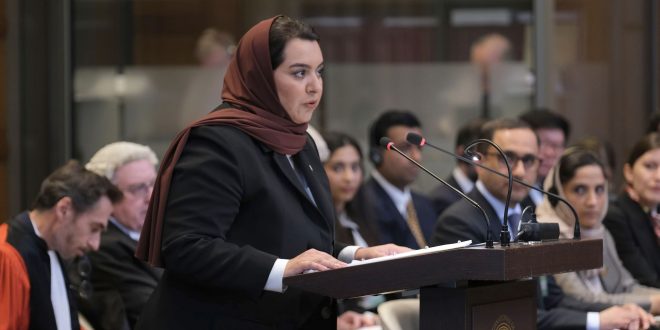The United Arab Emirates has labelled Sudan’s allegations at the International Court of Justice (ICJ) as “misleading”, and “pure fabrications”.
This came as the ICJ convened this morning to hear UAE’s response to Sudan’s application for provisional measures under the Convention on the Prevention and Punishment of the Crime of Genocide.
Reem Ketait, Deputy Assistant Minister for Political Affairs at the UAE Ministry of Foreign Affairs, addressed the court, outlining the UAE’s position.
Ketait began by expressing the UAE’s solidarity with the Sudanese people and acknowledging the “two years of devastation and displacement” in Sudan. She condemned the “unrelenting violence, attacks on civilians, and horrific acts of sexual and gender-based violence,” calling for perpetrators to be held accountable.
However, Ketait asserted that the court proceedings are not about the UAE’s obligations under the Genocide Convention. She accused Sudan, “one of the warring parties,” of misusing the court to make “false accusations” against the UAE and “deflect from their own responsibility” for the ongoing conflict.
A central point of the UAE’s argument was the lack of jurisdictional basis for the case. Ketait emphasised the UAE’s reservation to Article IX of the Genocide Convention, stating it was a “legitimate exercise of State sovereignty.” She added that the case filed by Sudan is an attempt to “circumvent state consent,” which is a “bedrock of our international legal order.”
She added that despite the jurisdictional challenge, the UAE participated in the hearings “out of respect for the Court and the principles of international law and justice,” reaffirming the UAE’s “unwavering commitment to its obligations under the Genocide Convention.”
Ketait detailed the UAE’s historical relationship with Sudan, highlighting over $4 billion in investments “to support the Sudanese people, strengthen Sudan’s institutions and progress its transition to a civilian-led government” prior to the April 2023 conflict. She referenced a military cooperation agreement from July 2020, stating that “official requests for assistance from the UAE came from General al-Burhan himself, in his capacity as President of the Transitional Sovereignty Council of the Republic of the Sudan.”
She stated that the UAE had not provided arms or related material to either warring party since April 2023. Instead, the UAE has worked to alleviate suffering, providing over $600 million in assistance through the United Nations and other partners. Field hospitals were established in Chad and South Sudan to assist refugees, including Masalit refugees. The International Federation of Red Cross and Red Crescent Societies has acknowledged the UAE’s critical humanitarian role.
Ketait reiterated the UAE’s call for an unconditional ceasefire, humanitarian pauses, and accountability for violations of international law by the Sudanese Armed Forces and the Rapid Support Forces. The UAE has supported regional and international mediation efforts, including those in Jeddah, Manama, and Switzerland. She highlighted the UAE’s co-hosting of the High-Level Humanitarian Conference for the People of Sudan in February 2025.
She criticised Sudan for rejecting the UAE’s offer to establish a field hospital in Port Sudan, refusing to return to talks in Jeddah, walking away from discussions in Manama, and refusing to attend the US-led mediation in Switzerland. She stated that “The Applicant rushes to this podium in the Hague, but for two years it has left its seat at the negotiation table empty.”
Ketait denied the UAE’s role as a “driver of this reprehensible conflict,” labeling Sudan’s allegations as “misleading” and “pure fabrications.” She accused Sudan of “an irresponsible pattern of behaviour,” seeking to “distract attention from their own culpability.”
She stated that Sudan had refused to allow the UN to establish a permanent humanitarian presence in Darfur, and that Sudan must cease deliberate and indiscriminate attacks on civilians, and stop obstructing humanitarian aid.
Ketait outlined the UAE’s legal team’s subsequent presentations, which would focus on the lack of jurisdiction, the rebuttal of Sudan’s legal arguments, and the absence of evidence to support its claims.
 UAE BARQ برق الإمارات – نبضك
UAE BARQ برق الإمارات – نبضك


